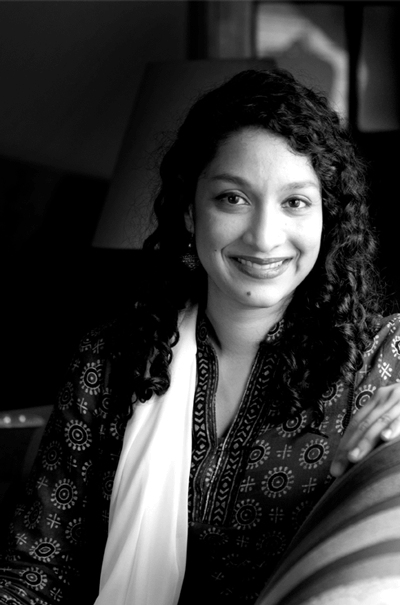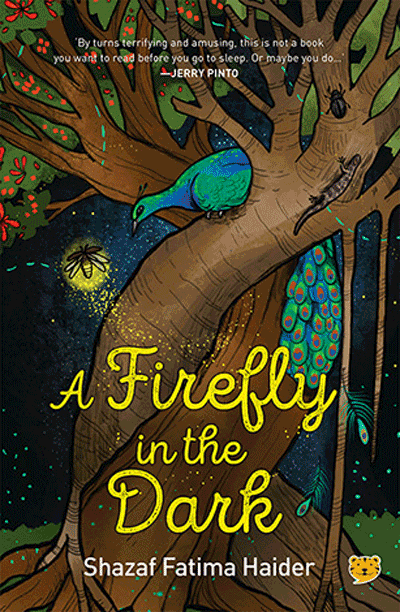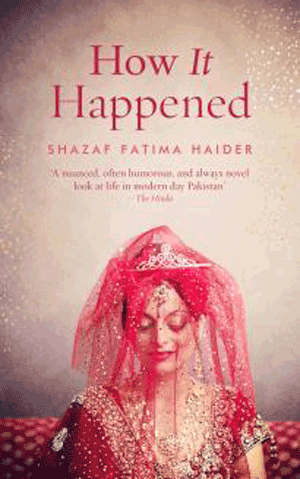Interview: Shazaf Fatima Haider
Shazaf Fatima Haider, full-time mother and part-time writer is the author of two critically acclaimed novels: How it Happened and A Firefly in the Dark. Her writing revolves around middle-class Pakistani families, and has been appreciated by readers and critics alike for its insightful commentary on the superficialities of desi families. Her second book recently won the Peek a Book prize in India for children’s literature and is soon to be adapted into a TV series. Haider sat down with Newsline to talk about her work, her authorial journey and the challenges of being a writer.

Shazaf Fatima Haider.
I have noticed a strong Pakistani backdrop in both your novels. Is this part of your identity as a Pakistani writer?
I am unashamedly Pakistani! Although I have moved to the UK, I still hear Pakistani voices and stories, and so I write about them, as well as about my own experiences. I write for a very desi audience, so I am definitely a Pakistani writer.
Both your novels are about a middle-class family. Where does that come from?
It comes from my limitation as a writer: I write what I know. There is so much to explore in the middle-class family setup. It has mostly been explored in Urdu literature, but not so much in Pakistani English literature. I am obsessed with it, because when you talk about middle-class families, you can talk about their values, inherited scripts and cultures that aren’t often discussed or questioned, because they are always associated with respectability. I am very interested in the psychosis of the middle-class families that I have explored in A Firefly in the Dark.

What about the encounters with jinns in Firefly in the Dark? Is that also rooted in a personal experience?
That was a personal challenge, to write something I’m not familiar with. I have never had any supernatural experiences or any encounters with invisible creatures. But I have known a lot of people who do coexist with these creatures. We acquaint jinns with black magic and mischief and a lot of danger. But jinns are like people — much like there are good people, there are good jinns. I thought if I was invisible and I had powers, why the hell would I want to bother human beings? I would have so many better things to do. I thought, let’s delve into this concept and read a lot about it. I did some research, and I realised that I believe jinns are real, but also exist as figments of my imagination. I conflated all of that with my own little mythology of what made the most sense to me.
The descriptions of the mythical creatures, and their relationship with humans, was quite interesting. Would you say an underlying theme of your books is coexistence?
Yes, coexistence but also empathy. For example, Sharmeen’s mother, Aliya, cannot empathise with her. She is trapped — all the adults in A Firefly in the Dark are trapped. Dadi in How it Happened is also trapped, in the way she thinks, but there is Fati Phups who challenges that line of thought. She does not listen to anybody, is independent and pretty outrageous. It’s not easy to be that person who changes things around. She was an idea of what I wanted to be, which I am not. So yes, coexistence and empathy are very important because at the end of the day, what moves you to change, is your love for other people. If you are stuck in inherited scripts and in the way things are, you are really not a person who deserves much space in the world. You are just one more individual, living life as a sheep.
Both your books have strong female characters, both old and young. Where does that come from?
I have grown up being surrounded by strong women and I fall in love with strong women, I am fascinated by them. Strong women do not necessarily always mean ‘good’ women. I am just really interested in the concept of strength. My mother is very strong, my sisters are very strong. Their characters prompt me to contemplate, who these women are: in doing so, I have tried to create well rounded characters.
Do you read reviews of your work? Does it affect you if you come across a negative review?
Yes, I do. I just got tagged on Instagram — someone said How it Happened very tedious and awful and they couldn’t finish it. And I found it a very interesting review because of what they chose to focus on: “why has she treated an older character so disrespectfully and so made such a drama out of her?” I found that very interesting. I wanted to engage in that, but it feels a bit odd. It’s almost as if I’m addressing the person merely to ask why they hated my book. I think a lot of people react to Dadi and Saleha based on their relationship with their mothers or their grandmothers. A lot of people treat How It Happened as a novel of great depth but it’s a comedy of manners, so these are type-characters. These are representations of who we find in middle-class families when people are getting married, and how each standard character behaves. It was meant to be slightly farcical. A lot of people tried to read it as hard-core human drama which it is not.
What is your writing process? Do you think about the issue first, or the characters?
How it Happened was all about the issue – which is arranged marriages – and the characters came organically around it. A Firefly in the Dark was a project-oriented thing. The characters came much later. So, it was different for both books because I am a different person writing every book. I was a college student when I wrote How it Happened, and then a teacher with a full-time job when I wrote A Firefly in the Dark. The writing process for the third book is very sporadic because I am a stay-at-home mom, so that focus is completely divided. For me, writing is something that happens after I live my life – it’s not something I do to live my life. I am not a full-time writer. In fact, I resist the identity of being a writer.

Why is that so?
Well, I’ve written three chapters in two years; I have been raising a child! I am someone who writes, and gets her books published and that’s very different from being a writer. I never tell people I am a writer because I think it’s a little bit of a reaction from looking at all the writers and intellectuals at literature festivals, who are completely preoccupied with themselves and are very self-congratulatory and very painfully concerned with image and how they are being received and how they are misunderstood. Oh god. Of course, I have met writers are very humble and they are more interested in listening and looking than talking about their work. I resist posturing of a writer and I think most of our Pakistani writers are guilty of that at some point or the other.
So, A Firefly in the Dark is being adapted into a TV series? Was that a surprise or was it part of the plan?
Complete surprise. It was the one of the highs of my writing journey. I had thought it would die a very slow death. I thought a few people would read it, and that’s it. Because it’s not one of those books that was an easy sell. However, I will not be involved with the production,b once you write your own novel and sell it, you realise you are sick of it and are ready to part with it.
What are the realities of finding a publisher? Does it get easier after your first book, especially if it is successful?
Finding a publisher is a very ego-busting experience. It’s not like if you have published two books, it will be easier. Except for the big ones, like Shamsi and Hamid. They have made it and they have done well, and they have paved the way for writers like me to write about other things and make writing a more accessible thing. I found it very difficult to find a publisher for A Firefly in the Dark because it’s not a book that fits in a category; it’s not a children’s book, it’s not an adult’s book either. It’s desi-fantasy and these things don’t really merge really well. I thought after How it Happened, my second book will be easy. It’s very much a struggle if you have not actually made it to the big leagues and won prizes. I also know many successful writers who struggle to find publishers because not everything you write will be marketable. Publishers want to sell their books, so they are out there for marketable stories, but some people don’t want to compromise the truth of their story for marketability.
Do you ever plan what the next 30 years of your writing career will look like? What kinds of books do you want to write?
I want to be someone who doesn’t write the same kind of book all the time. I would like to write a book about divorce then I would like to write a book in Mills and Boons fashion. I would like to write a book about motherhood too. I also want to write a murder-mystery one day. I am very proud of the fact that I have written two completely different books. I would also like to write about women who I do not like and cannot relate to. I have already started putting a character together for my next book. I think I will always write more about women than about men. I want to experiment with everything and I want to take it to its natural conclusion. If I could write a political thriller that would win me a lot of prizes, I would, but I can’t do that. That is not where my brain goes and it’s not what I am preoccupied with.
Are there any other forms of writing that you would like to explore, or is your heart set on novel-writing?
I could do some scriptwriting. I think I can write dialogue, because I like listening to people talk but that will be when my children are much older. I would love to go back to school and learn some about it. Right now, I don’t have the luxury of time, so I stick to that which I know the best. With a new form of writing, I just don’t know where to start, so that will happen much later.
What are you currently working on and when can we expect your next novel?
I am writing a novel about what a woman goes through when she gets divorced: the middle-class psychosis and the hypocrisy, the indignities, the sufferings that divorced women are put through for no reason. I would like to explore how women stab each other in the back, because when it comes to divorce, the patriarchy works very much through the women, not through the men. I don’t know when it will be ready because my primary project right now is bringing up some children. If a lot of you buy A Firefly in the Dark and How it Happened, then I can afford a nanny and write my story. But I think it’s going to be interesting because I already like it. You know a story is worth the time when your brain can’t stop thinking about it!



